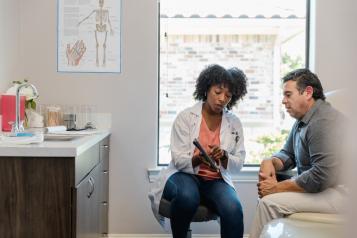Nearly a fifth confess to knowingly using A&E for non-emergencies

1 in 4 respondents said it is likely they would resort to using A&E in the future if they were unable to get a GP appointment in a reasonable timeframe, with 1 in 3 stating that they would do so if the non-emergency situation occurred outside of GP opening hours.
Despite two thirds of respondents expressing concern about the NHS's ability to cope with the pressure on urgent and emergency care, the research suggests that when it comes to our own health and that of our loved ones, many of us will continue to use services how we want, when we want, until real alternatives are provided.
The survey results also identified an issue with awareness of alternatives. Around a third of those who responded said that they didn't know where their nearest minor injuries unit or NHS walk-in centre was or the services it provides. While 4 out 5 people said they were aware of NHS 111 just 1 in 5 report having used it or its predecessor NHS Direct when in need of none urgent care.
Millions have been spent on poster campaigns, radio advertising and even apps to 'educate' us about how to make the most appropriate use of services. However, these results show there is still more to be done.
Local Healthwatch have spent the winter out in force talking to patients about what is really going on in hospitals around the country and why. (see case studies). In support of their work, Healthwatch England commissioned YouGov to survey 1,762 people to find out how and why patients end up in A&E and what can be done to ease the pressure on this vital frontline service.
Ultimately the problem seems to be the lack of services provided elsewhere. GPs simply aren't flexible enough to meet consumers' needs, at the same time walk-in centres are being closed and social care is under significant pressure.
In order to stop people using A&E as a 'catch-all' service the health and care system will have to become more consumer focused and develop new products and services to entice us elsewhere within the system. There is some work ongoing in this area already – the Keogh review of emergency care for example, which is welcome – but more, and more radical seems to be required to meet consumer need.
This is not a 'quick-fix' but is the only way we can start to really address the ongoing cycle of winter pressures on A&E.
Anna Bradley, Chair of Healthwatch England, said:
"Open all hours, with drugs on tap and guaranteeing to see patients within 4 hours, A&E has become NHS Express. The problem is it was never designed to be a catch-all service and nor should it be allowed to become one.
"But blaming people for going to the 'wrong place' when we need care and support is the wrong way of looking at the problem.
"I'm not absolving us of our responsibility not to clog A&E whenever we get the sniffles, but until the health and care sector offers a more consumer-friendly experience, things are unlikely to improve."
For those struggling to access alternatives or who are frustrated that they have been unable to get an appointment with a GP or other NHS services we urge you to get in touch with your local Healthwatch who can help to raise your concerns on your behalf and use your experience to encourage improvements for the future.
Case studies
Healthwatch East Sussex surveyed patients across the county's two A&E and three minor injuries units and found that more than half (51 per cent) of patients had gone straight to A&E without seeking help elsewhere first, with less than a quarter attempting to speak to their GP before turning up at the hospital. The local Healthwatch team are now working with the NHS Trust and local Clinical Commissioning Groups to improve local signposting of services in a hope of easing some of the pressure on A&E.
Following the CQC’s most recent critical report about Wexham Park Hospital, in part, due to overcrowding in its A&E department, Healthwatch Windsor, Ascot and Maidenhead has embarked on major information gathering exercise to collect patient views on how things could be improved. The Chair of Healthwatch Slough, which is also served by the Hospital, has also issued a call to local media appealing for people to use services responsibly after reports that one parent turned up to A&E after their child got chewing gum stuck in their hair.
Healthwatch Dudley delivered community research on urgent care on behalf of Dudley Clinical Commissioning Group. The staff worked with 16 volunteers to survey around 1000 local people over a week at Russells Hall Hospital Accident and Emergency and Dudley Walk in Centre. The research indicated that 37% of those surveyed who presented themselves at A&E or at the Walk in Centre, were dissatisfied with their experience of getting into a GP surgery. In addition to this, the survey found that even when people were satisfied with their GP service, many patients still attended the Walk in Centre because they wanted to be seen sooner. As a result Healthwatch Dudley have been invited to join local health commissioners in developing a new way forward for Urgent Care in Dudley Borough.


